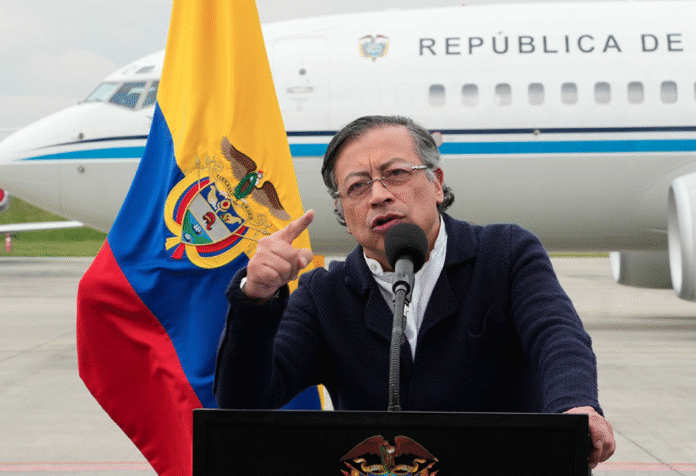Colombian President Gustavo Petro on Wednesday struck a defiant tone against U.S. President Donald Trump, two days after Washington conditionally decertified the nation for failing to meet its anti-drug commitments over the past year.
The decision, announced Monday by the U.S. Department of State, placed Colombia in the same category as Venezuela, Bolivia, Afghanistan, and Myanmar – countries labeled as failing partners in the global drug war. While the White House stopped short of cutting off aid, it warned that future support would hinge on Bogotá restoring extraditions of “all narco-terrorists without conditions” and reducing cocaine output.
“The failure of Colombia to meet its drug control obligations over the past year rests solely with its political leadership,” Trump said in the presidential memorandum, faulting Petro’s “failed attempts to seek accommodations with narco-terrorist groups.”
Colombia, which has received more than $14 billion in U.S. assistance since the Clinton administration (1993-2001), has long been Washington’s most steadfast ally in Latin America’s anti-drug strategy. But relations between Trump and Petro, the country’s first leftist president, have quickly soured over drug policy, Venezuela, and irregular migration.
Petro, speaking from a podium at the CATAM airbase in Bogotá, called the U.S. decision an “injustice” and a “profound grossness” against a country that, he argued, has sacrificed more lives than any other to stem the flow of cocaine.
“This is a deep insult to a society that has spilled the most blood so that the United States and Europe consume less cocaine, and obviously an insult to my own life,” Petro said, referencing decades of violence that have claimed thousands of police, soldiers, and civilians.
Petro claimed that he personally has faced assassination attempts and persecution for opposing drug cartels, comparing his fight to that of the slain Liberal presidential candidate Luis Carlos Galán.
“When a person and their family are attacked, one must defend oneself. When an entire society is unjustly attacked, we must defend our sovereignty. Colombia’s sovereignty is not for sale,” he declared.
The president defended his government’s record, contrasting it with that of his predecessor, Iván Duque. “We have eradicated 25,000 hectares under my government,” Petro said. “With voluntary eradication, farmers are no longer planting more coca as they did under Duque, nor are mafias incentivized to expand.”
Petro also argued that his administration has seized unprecedented quantities of cocaine. “I gave the strict order to seize everything in sight without threatening any other country,” he said.
Extradition dispute
Extradition has emerged as a contentious issue between Bogotá and Washington. The U.S. has urged Colombia to immediately expedite extraditions of suspected traffickers, calling them vital to bilateral security.
Petro revealed that during his government, 403 individuals were subject to extradition requests. Of those, he said, 400 had been sent to stand trial in the United States. “I am seeing if three of them make peace. If they do, they will remain in Colombia, just as others who have made peace remain here,” he said.
The president argued that suspending extradition in such cases was consistent with Colombian law and his administration’s “total peace” agenda, which seeks to end decades of armed conflict. “This process would mean a peaceful solution for these figures who have pending accounts with justice,” he said. “Because Article 22 of the National Constitution says peace is a right”.
Petro rejected the notion that he was shielding criminals, saying extradition suspensions would only apply if individuals made verifiable commitments to abandon violence and trafficking.
In unusually personal remarks directed at a U.S. president, Petro challenged Trump to stop “threatening countries” and accused him of ignoring Colombia’s record. “Here I await you, if you wish. Do not threaten nations,” he said.
He also went on to criticize U.S. anti-drug policy as a “50-year failure,” pointing to America’s own overdose crisis. “You have 3,000 deaths from cocaine overdoses and 100,000 from fentanyl. That shows your policy failed.”
In a pointed warning, Petro alleges that “extreme right-wing” political forces in Miami, allied with Trump’s Republican base, have ties to Colombian narcotraffickers. “Be very careful,” he said, claiming he could show evidence from judicial investigations and confessions.
Financial markets reacted swiftly to the decertification. Colombian dollar bonds fell across the curve on Tuesday, with notes due in 2053 losing more than half a cent to trade below 113 cents on the dollar, according to Bloomberg data. The peso held steady below COP$4,000 to the greenback.
“The decision is likely to hit foreign investment, multilateral funding, and tourism,” Bloomberg reported, warning that Colombia could lose up to $1 billion annually if Washington intensifies travel warnings.
Analysts believe the White House’s decision to issue a waiver, keeping aid flowing, signaled Washington’s desire to avoid escalating tensions. “Given the strategic value of the bilateral relationship and the possibility of change in the upcoming elections, the U.S. would avoid an escalation at this juncture,” remarked Alejandro Arreaza, economist at Barclays.
The potential rupture of a historic 200-year old alliance puts Colombia at a delicate crossroads. Once hailed as a success story of U.S. security cooperation, the country now faces international scrutiny amid the largest cocaine boom in recent history. The White House argues that production has risen sharply under Petro’s watch, who has used his “total peace” agenda to grant amnesty to dangerous drug traffickers.
At the close of his remarks, Petro again turned to Trump with a defiant message: “Do not threaten me, and here I await you if you wish. I do not accept invasions, I do not accept missiles, I do not accept assassinations”

